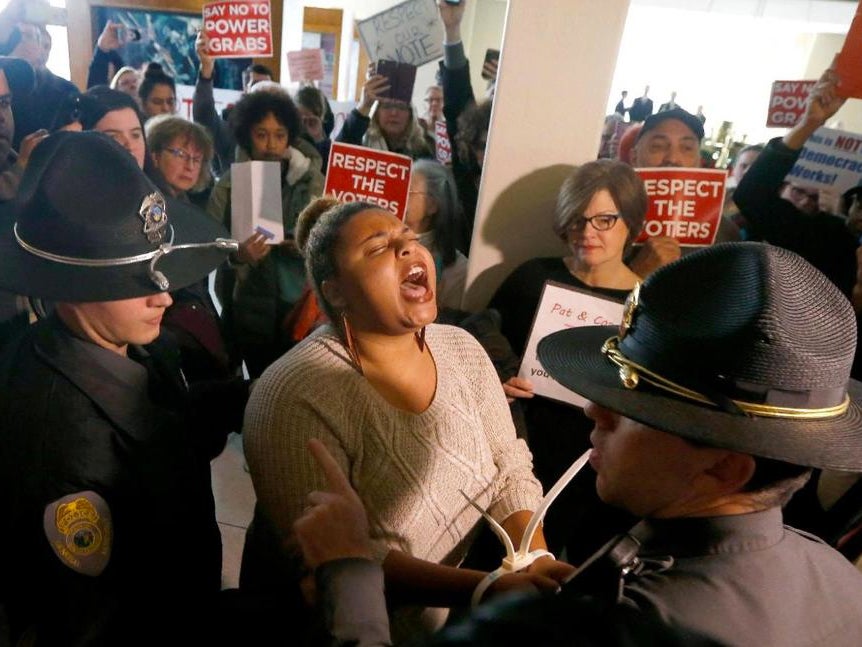North Carolina is no longer a democracy, report says
The analysis likens the Tar Heel state to countries like Iran, Cuba, and Venezuela

Your support helps us to tell the story
From reproductive rights to climate change to Big Tech, The Independent is on the ground when the story is developing. Whether it's investigating the financials of Elon Musk's pro-Trump PAC or producing our latest documentary, 'The A Word', which shines a light on the American women fighting for reproductive rights, we know how important it is to parse out the facts from the messaging.
At such a critical moment in US history, we need reporters on the ground. Your donation allows us to keep sending journalists to speak to both sides of the story.
The Independent is trusted by Americans across the entire political spectrum. And unlike many other quality news outlets, we choose not to lock Americans out of our reporting and analysis with paywalls. We believe quality journalism should be available to everyone, paid for by those who can afford it.
Your support makes all the difference.North Carolina can no longer be classified as a full-fledged democracy, according to a bombshell report that likens it to countries like Cuba, Indonesia, and Sierra Leone.
The Electoral Integrity Project gave the state a score of 58/100. When it came to legal framework and voter registration, North Carolina earned a 7/10 – similar to Iran and Venezuela.
“If it were a nation state, North Carolina would rank right in the middle of the global league table – a deeply flawed, partly free democracy that is only slightly ahead of the failed democracies that constitute much of the developing world," wrote Andrew Reynolds, a professor of political science at the University of North Carolina and co-founder of the EIC, which has measured 213 elections in 153 countries since 2012.
The outgoing Republican administration, led by Gov Pat McCrory, sparked massive protests at the statehouse last week after passing a law that gutted the powers of the incoming Governor-elect Roy Cooper.
Mr McCrory’s defeat stemmed from his backing of the so-called bathroom bill, that forces people to use the bathroom that corresponds with the gender listed on their birth certificates – not according to their gender identity.
The state failed to repeal the law after congressional Republicans reneged on their plan to vote for the overturn.
Turmoil amongst legislators is illustrative of some of the issues the EIP focused on in its report – among which are unfair districting that helps shift unchecked power to the GOP, giving the party almost uncontested control of the state.
“[L]egislative power does not depend on the votes of the people,” Mr Reynolds wrote. “One party wins just half the votes but 100 per cent of the power. The GOP has a huge legislative majority giving it absolute veto-proof control with that tiny advantage in the popular vote.
“The other party wins just a handful of votes less and zero per cent of legislative power.”
North Carolina Democratic Party chair Patsy Keever agreed with the assessment and lambasted state Republican leaders for their apparent grab for power.
“[Senate leader Phil] Berger and [House Speaker Tim] Moore are power hungry leaders whose number one goal is to protect their power no matter the cost,” Ms Keever told the Huffington Post.
She added: “Since 2010, the NC GOP has systematically engaged in a dangerous partisan political agenda, making it harder for people to vote, changing the nature of the State Board of Elections and stripping an incoming Democratic governor of power.
“That’s not what democracy looks like – and North Carolinians deserve better.”
Following Mr McCrory’s election loss, he signed into law two bills that would greatly strip power from the incoming Democratic governor.
The new House Bill 17 cut the number of people Mr Cooper can appoint to Cabinet positions, and requiring approval from the Republican-controlled Senate. He also signed Senate Bill 4, increasing the state elections board from five to eight officials – with four to be chosen by the governor and four by the Senate.
North Carolina recently came under fire for its voter identification laws that a federal court determined targeted the black population “with almost surgical precision”. The laws prompted the NAACP to sue North Carolina for voter suppression late October.
“The Tar Heel state is ground zero in the intentional surgical efforts by Republicans – or extremists who have hijacked the Republican Party – to suppress the voice of voters,” said North Carolina NAACP president Rev William Barber. “The NAACP is defending the rights of all North Carolinians to participate in this election.”
In the days leading up to the election, the North Carolina Republican Party issued a press release boasting of lower black voter turnout numbers. Showing an apparent 8.5 per cent decrease since 2012, the released concluded that the “Obama coalition is crumbling”.